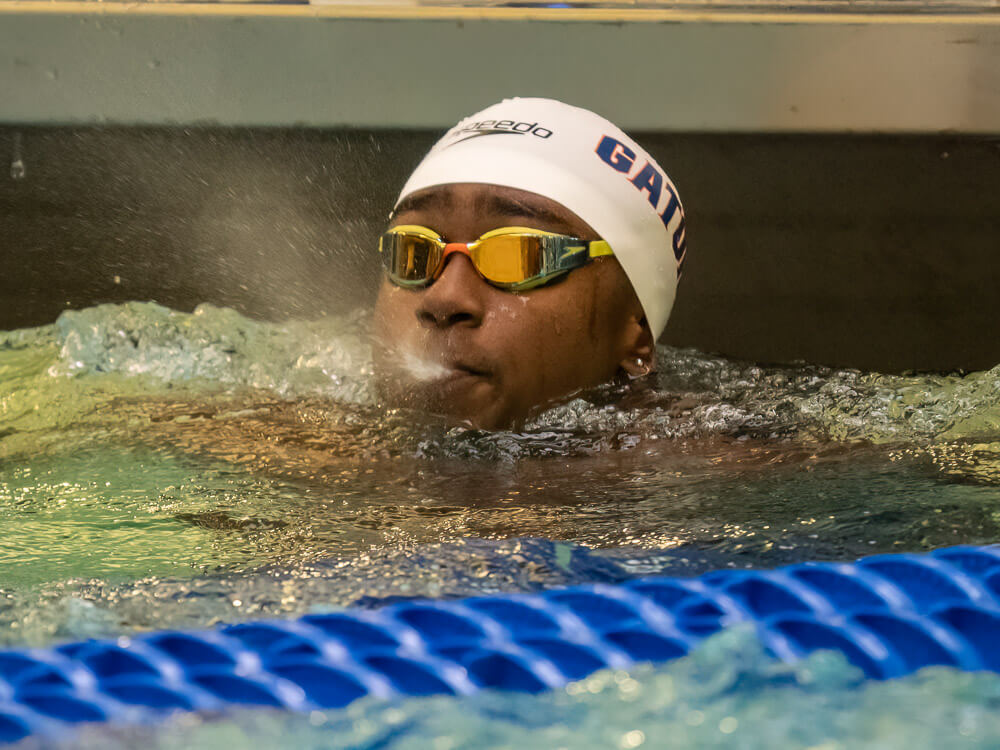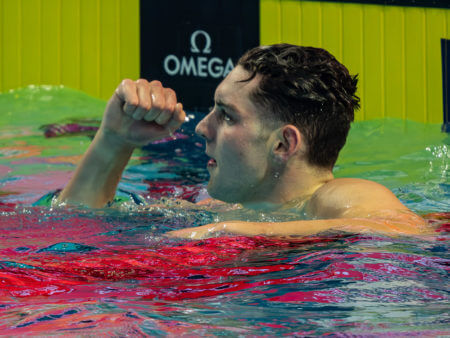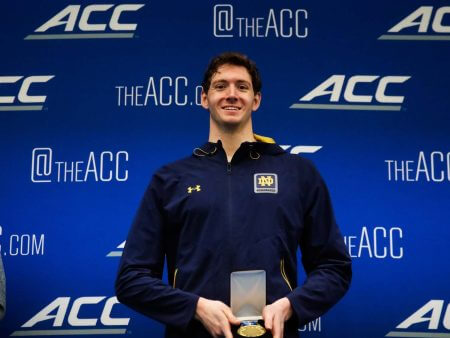Men’s 100 Freestyle Stars Gearing Up For Exciting NCAA Showdown

Men’s 100 Freestyle Stars Gearing Up For Exciting NCAA Showdown
Perhaps the best race of conference championships week one came Saturday evening in Auburn, Ala., in the SEC final of the men’s 100 freestyle. The race pitted Florida’s Josh Liendo, the second-fastest man ever in the event behind Caeleb Dressel, against Tennessee’s Jordan Crooks, the only man aside from Dressel to ever clock a sub-18-second 50 free. These two men had the credentials, but neither could get much separation from the Volunteers’ Gui Caribe or the Gators’ Macguire McDuff.
Liendo had the lead for most of the race, but Crooks made a charge down the stretch, only to come up eight hundredths short. Liendo got the win in 40.82, just ahead of Crooks (40.90), Caribe (40.99) and McDuff (41.30).

Jack Alexy — Photo Courtesy: Peter H. Bick
When those four again race a high-stakes 100 free at the NCAA Championships next month, the quality of the field will be even higher. Enter the Cal duo of Jack Alexy and Bjorn Seeliger, who placed second and third, respectively, at last year’s national championships. Enter Chris Guiliano, the Notre Dame junior whose winning time at the ACC Championships, 40.62, was quicker than anyone at the SEC meet and good for third-fastest in history.
Enter Virginia Tech’s Youssef Ramadan and Ohio State’s Ruslan Gaziev, both A-finalists last year when the standard for advancing into the top-eight was a vicious 41.34. Yes, the field was really that fast. Texas’ Luke Hobson, who had already won national titles in the 200 and 500 free, clocked 41.99 in prelims and failed to even advance to the consolation final.
We should expect more of the same this year, with the SEC final a mere preview of what might unfold on the national level in Indianapolis. The field is similar to 2023, but each of the top contenders has been through the ringer of high-level competition in the months since. Entering last year’s final, Liendo had won individual medals at the World Championships while Brooks Curry had also been in the Worlds final of the 100-meter free, but that was about it.
Now, Alexy is the World Championships silver medalist in the 100-meter free (and the 50 free). Crooks erased doubts about his long course abilities by storming into a pair of finals at last year’s World Championships. Guiliano, an afterthought in the field last year, finished second in the 100-meter free at U.S. Nationals and then dropped a half-second from his best time in a time trial at the conclusion of the ACC Championships. Caribe was an individual semifinalist at Worlds while Gaziev split 47.30 and 47.58 on a pair of Canadian relays.
The current national standings are, in order, Guiliano, Liendo, Crooks, Caribe and McDuff, with Gaziev set to show his form at this week’s Big Ten Championships while Alexy, Seeliger, and Arizona State group led by Jonny Kulow and potentially Stanford’s Andrei Minakov are set to show their speed one week later at the Pac-12 Championships.
As we approach NCAAs, here are some important questions awaiting in the 100 free:
Will it take sub-41 to make the A-final at NCAAs? Such a scenario is feasible given the speed shown already this year and the competitive nature of the national meet. Most likely, two or three men get into the top heat with 41-low performances, but some big-name contenders could get left out. That’s quite a jump from only two years ago, when Curry was the lone swimmer to break 41 in the 100 free final. In fact, before four swimmers went sub-41 last year, there had never been an NCAA final with more than two 40-second swims.

Chris Guiliano — Photo Courtesy: Jaylynn Nash
Will we see any 39s? In the final individual swim of his college career, Dressel clocked 39.90 in the 100 free to become the first man under 40, a swim long anticipated after he went 40.00 one year earlier. No one had come within a half-second of that time until Liendo won last year in 40.28. Could one of these men make the jump onto Dressel’s level or perhaps get his record? More likely would be a 39-second relay split, which has never happened. Dressel owns the quickest split ever at 40.15, with Guiliano coming extremely close with his 40.17 medley relay anchor leg at ACCs.
How is the U.S. men’s 400 free relay shaping up? In an Olympic year, we look everywhere for hints about what is to come in long course season, and that’s especially true in the 100 free. The United States won World Championships bronze last year, ending a seven-year winning streak in the event, but it’s worth noting that the finals lineup included three rookies, including Alexy and Guiliano. We have seen both make improvements since Fukuoka, and strong swims on the college level would be positive signs for their long course potential, with both men having a big chance at boosting the Americans’ golden potential. The other swimmer to watch here is McDuff, who missed out on a World Championships opportunity by one spot and six hundredths last year.
Could the Canadians make a statement? While Canada’s women have become prolific relay-medal winners, the Canadian men have not won an Olympic medal in a men’s relay since 1992. On the World Championships level, the drought goes back to 2007. But Liendo and Gaziev comprised the first half of a group that placed fifth at Worlds last year. If they can produce big swims at NCAAs, that will definitely send Canada toward the Olympics with some momentum in this relay.



